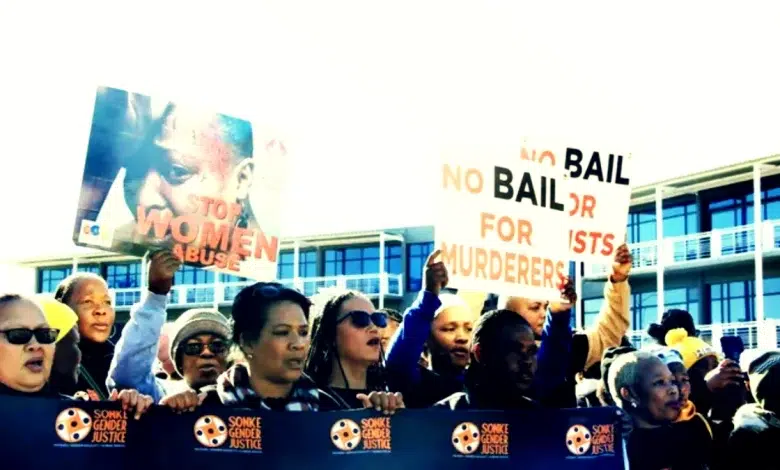SA GBV Stats: 969 Women Murdered – Chikunga Pushes for Stronger Partnerships

South Africa continues to grapple with an alarming gender-based violence (GBV) crisis. Recent official statistics reveal that 969 women were murdered in the past year. This underscores the urgent need for intensified action and collaboration among government, civil society, and communities.
RELEVANT ARTICLE: Police Step Up Fight Against Gender-Based Violence Amid Ongoing Challenges
The Grim Reality of Gender-Based Violence in South Africa
Gender-based violence remains one of the most severe human rights violations in South Africa. According to the latest report by the South African Police Service (SAPS) covering April 2022 to March 2023, 53,498 sexual offences were reported. These include 42,780 cases of rape. Despite national efforts such as the 2020 National Strategic Plan (NSP) on GBV and Femicide, these numbers continue to rise. This reflects both the scale of the problem and the ongoing challenges in addressing it effectively.
The 2024/2025 Fourth Quarter Crime Statistics released in May 2025 confirm a disturbing trend. Violence against women remains disproportionately high. The murder of women increased by 8.6% during this period. Gauteng and KwaZulu-Natal provinces contributed nearly 40% of national rape cases. These statistics highlight the persistent vulnerability of women to extreme violence, including femicide.
Chikunga’s Call for Stronger Partnerships
In response to these alarming figures, Minister Sindisiwe Chikunga, has called for stronger partnerships between government agencies, civil society organisations, and communities. She emphasises that tackling GBV requires a multi-sectoral approach. It must go beyond law enforcement to include prevention, survivor support, and social transformation.
Chikunga stresses the importance of coordinated efforts to dismantle patriarchal norms and systemic barriers that perpetuate violence. She advocates for increased funding for survivor-centred services, including counselling, legal aid, and safe shelters. Additionally, she calls for long-term prevention strategies such as education and male engagement programmes.
Root Causes and Societal Attitudes
Research from the Human Sciences Research Council (HSRC) and other bodies reveals deeply ingrained gender norms that fuel GBV. Approximately one in three women aged 16 and older has experienced physical violence. Meanwhile, one in five has suffered sexual abuse. Surveys show that many men hold regressive views on gender roles. Nearly 70% believe a wife should obey her husband, and some endorse the use of violence as discipline.
These attitudes are compounded by historical, cultural, and socio-economic factors. The legacy of apartheid, patriarchal traditions, and economic inequality all contribute to a climate. In this environment, violence against women is normalized and underreported.
Government Initiatives and Challenges
The South African government has launched several initiatives to combat GBV. The Justice, Crime Prevention and Security Cluster (JCPS) initiated a 90-day GBV+F blitz starting May 2025. The blitz aims to strengthen frontline safety and improve coordination among departments. The Inter-Ministerial Committee on GBV+F has been revived to address systemic bottlenecks. It aims to ensure measurable progress.
Despite these efforts, challenges remain. Weak law enforcement, corruption, underfunding, and a reactive rather than preventative approach continue to hamper progress. The National Prosecuting Authority (NPA) has adopted a victim-centric approach to improve case management. However, delays and low conviction rates persist.
The Economic and Social Impact
Beyond the human toll, GBV imposes a heavy economic burden on South Africa. A 2014 KPMG report estimated the annual cost of GBV to be between R28 billion and R42 billion. This is equivalent to up to 1.3% of the country’s GDP. This includes costs related to healthcare, legal, social services, and lost productivity.
The social consequences are equally devastating, affecting families, communities, and the nation’s development. Survivors often face stigma, trauma, and long-term health issues, while children exposed to violence suffer lasting psychological harm.
Support and Resources for Survivors
South Africa has established critical support mechanisms. Among these are Thuthuzela Care Centres, which provide integrated medical, psychosocial, and legal services to rape survivors. National helplines such as the GBV Helpline (0800 150 150) and organisations like Sonke Gender Justice offer vital assistance.
However, experts stress the need for expanded access, especially in rural and underserved areas. Services that prioritise survivor dignity and empowerment are also crucial.
A Call to Action
The murder of 969 women in South Africa last year serves as a stark reminder of the urgent need to intensify efforts against gender-based violence. Chikunga’s call for stronger partnerships highlights that no single sector can solve this crisis alone. It demands a united front involving government, civil society, communities, and individuals. These stakeholders must be committed to transforming attitudes and systems.
Sustained political will, adequate funding, effective law enforcement, and comprehensive prevention strategies are essential to curb this epidemic. Only through collective action can South Africa hope to protect its women and build a safer, more equitable society.



